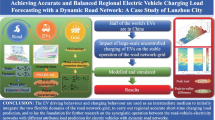Abstract
The functional k-means problem involves different data from k-means problem, where the functional data is a kind of dynamic data and is generated by continuous processes. By defining a new distance with derivative information, the functional k-means clustering algorithm can be used well for functional k-means problem. In this paper, we mainly investigate the seeding algorithm for functional k-means problem and show that the performance guarantee is obtained as \(8(\mathrm{ln}~k+2)\). Moreover, we present the numerical experiment showing the validity of this algorithm, comparing to the functional k-means clustering algorithm.
Access this chapter
Tax calculation will be finalised at checkout
Purchases are for personal use only
Similar content being viewed by others
References
Abraham, C., Cornillon, P.A., Matzner-Løber, E., Molinari, N.: Unsupervised curve clustering using B-splines. Scand. J. Stat. 30(3), 581–595 (2003)
Aggarwal, A., Deshpande, A., Kannan, R.: Adaptive sampling for k-means clustering. In: Dinur, I., Jansen, K., Naor, J., Rolim, J. (eds.) APPROX/RANDOM -2009. LNCS, vol. 5687, pp. 15–28. Springer, Heidelberg (2009). https://doi.org/10.1007/978-3-642-03685-9_2
Arthur, D., Vassilvitskii, S.: \(k\)-means++: the advantages of careful seeding. In: Nikhil, B., Kirk, P., Clifford, S. (eds.) SODA 2007, Theory, pp. 1027–1035. SIAM, Philadelphia (2007). https://doi.org/10.1145/1283383.1283494
Boullé, M.: Functional data clustering via piecewise constant nonparametric density estimation. Pattern Recogn. 45(12), 4389–4401 (2012)
Bouveyron, C., Brunet-Saumard, C.: Model-based clustering of high-dimensional data: a review. Comput. Stat. Data Anal. 71, 52–78 (2014)
Gamasaee, R., Zarandi, M.: A new Dirichlet process for mining dynamic patterns in functional data. Inf. Sci. 405, 55–80 (2017)
Har-Peled, S., Sadri, B.: How fast is the \(k\)-means method? Algorithmica 71(3), 185–202 (2005)
Jacques, J., Preda, C.: Functional data clustering: a survey. Adv. Data Anal. Classif. 8(3), 231–255 (2014)
Kayano, M., Dozono, K., Konishi, S.: Functional cluster analysis via orthonormalized Gaussian basis expansions and its application. J. Classif. 27(2), 211–230 (2010)
Lloyd, S.: Least squares quantization in PCM. IEEE Trans. Inf. Theory 28(2), 129–137 (1982)
Meng, Y., Liang, J., Cao, F., He, Y.: A new distance with derivative information for functional \(k\)-means clustering algorithm. Inf. Sci. 463–464, 166–185 (2018)
Ostrovsky, R., Rabani, Y., Schulman, L., Swamy, C.: The effectiveness of Lloyd-type methods for the \(k\)-means problem. J. ACM 59(6), 28:1–28:22 (2012)
Park, J., Ahn, J.: Clustering multivariate functional data with phase variation. Biometrics 73(1), 324–333 (2017)
Peng, J., Müller, H.G.: Distance-based clustering of sparsely observed stochastic processes, with applications to online auctions. Ann. Appl. Stat. 2(3), 1056–1077 (2008)
Preda, C., Saporta, G., Lévéder, C.: PLS classification of functional data. Comput. Statistics 22(2), 223–235 (2007)
Tarpey, T., Kinateder, K.K.: Clustering functional data. J. Classif. 20(1), 93–114 (2003)
Acknowledgments
The first author is supported by Higher Educational Science and Technology Program of Shandong Province (No. J17KA171). The second author is supported by National Natural Science Foundation of China (No. 61433012), Shenzhen research grant (KQJSCX20180330170311901, JCYJ20180305180840138 and GGFW2017073114031767). The third author is supported by National Natural Science Foundation of China (No. 11531014). The fourth author is supported by National Natural Science Foundation of China (No. 11871081).
Author information
Authors and Affiliations
Corresponding author
Editor information
Editors and Affiliations
Rights and permissions
Copyright information
© 2019 Springer Nature Switzerland AG
About this paper
Cite this paper
Li, M., Wang, Y., Xu, D., Zhang, D. (2019). The Seeding Algorithm for Functional k-Means Problem. In: Du, DZ., Duan, Z., Tian, C. (eds) Computing and Combinatorics. COCOON 2019. Lecture Notes in Computer Science(), vol 11653. Springer, Cham. https://doi.org/10.1007/978-3-030-26176-4_32
Download citation
DOI: https://doi.org/10.1007/978-3-030-26176-4_32
Published:
Publisher Name: Springer, Cham
Print ISBN: 978-3-030-26175-7
Online ISBN: 978-3-030-26176-4
eBook Packages: Computer ScienceComputer Science (R0)




